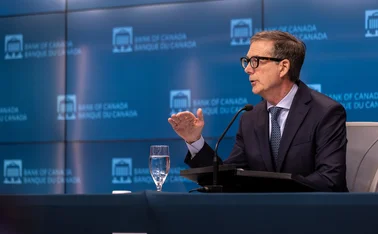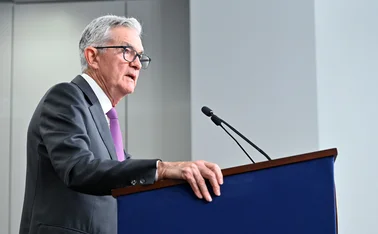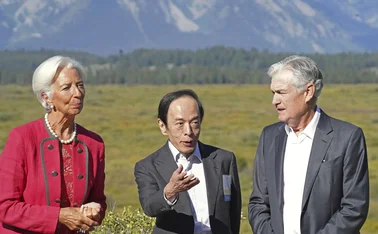
Fed’s Williams floats co-ordinated shift from 2% targets
Mandates could change in unison to avoid QE world

Central banks around the world should consider co-operating and co-ordinating efforts to change their 2% inflation targeting mandates, John Williams, president of the Federal Reserve Bank of San Francisco, tells Central Banking journal.
Williams, who took on his current role in 2011 and sits on the Federal Open Market Committee on a rotating basis, believes 2% inflation targets adopted by most of the developed world’s central banks will prove to be suboptimal over the next 10 years.
This is based on his belief that real productivity and the associated natural rate of interest (used in the Taylor rule, for example) are both in decline – and there is no reason to believe this will change in the next decade or so.
“There could be a mutual benefit for countries to change their price-stability policies together,” says Williams in the in-depth interview, published on September 27.
The San Francisco Fed chief predicts moving forwards “normal economic conditions” in the US will reflect inflation at 2% with interest rates standing at around 2.5%. “That is low,” he says. “And, if historically the Fed usually cuts interest rates by 4–5 percentage points during typical recessions, that is no longer possible if you are starting at 2.5–3.0%.”
The logical implication is that central banks will need to resort to unconventional policies such as quantitative easing (QE), forward guidance or some way of committing to keep interest rates low for a longer time on a more regular basis, in the event of economic downturns, says Williams, “so unconventional policy becomes conventional”.
Williams, who has conducted pioneering research into changes in productivity and the neutral rate of interest, says the trend to a lower natural rate of interest is not just a US phenomenon: “It’s happening, according to our research, in Europe and Canada. Others have done research showing Japan’s natural rate of interest has also fallen to very low levels.”
Beggaring thy neighbour
“QE is viewed – fairly or unfairly (I would say unfairly) – as a ‘beggar-thy-neighbour’ policy,” he says. “Research has indicated that if several countries are at the lower bound, while these policies primarily work by boosting demand, they also result in shifting demand from one country to another. So maybe co-operation and co-ordination should be happening in the discussion about frameworks.”
Williams says if all central banks stick with “current low inflation targets”, when one country has to stimulate the economy via QE, “a lot of the effect will happen through demand shifting, or beggaring thy neighbour”: “The scary scenario is a repeat of what we’ve seen, where everybody’s at the lower bound – not because of a crisis, but due to the reasons recessions happen – and we’re all stuck with uncomfortable choices.”
Regular mandate reviews
He believes central banks, including the Federal Reserve, should review their policy mandates on a frequent basis.
One way to avoid resorting to unconventional policies so much in the future is for central banks to consider raising their inflation targets – perhaps to 4% – or move to price-level targets, where any deviations from the target cumulatively require correction.
So far, the Federal Reserve, which introduced explicit inflation targeting in 2012, has made no effort to formally review its mandate. Other central banks, such as the Bank of Canada, that do review their policy frameworks on a regular basis have stuck with 2% targets for the time being.
But Williams warns: “If everybody is pursuing QE-type policies, this creates complications. We know from recent experiences, it’s a very challenging environment to stimulate the economy and get inflation back.”
The Fed has raised interest rates four times to 1.00–1.25% since 2015, and is only now embarking on an effort to unwind the $4.5 trillion of government and mortgage securities held on its balance sheet because of QE.
“If you want to see my gloomy view of the future, just open up your computer and look at the last five years,” he says. “I’m not saying that we’re going to have another financial crisis, it’s just that the challenges of using interest rates to keep the economy on track and inflation stable are going to be very difficult.”
Instead of people calling for central banks to co-ordinate regular policy actions – which Williams says is “almost impossible, tactically, in most circumstances” – they should engage in a “true policy strategy debate”.
The interview took place on September 5, 2017.
Only users who have a paid subscription or are part of a corporate subscription are able to print or copy content.
To access these options, along with all other subscription benefits, please contact info@centralbanking.com or view our subscription options here: www.centralbanking.com/subscriptions
You are currently unable to print this content. Please contact info@centralbanking.com to find out more.
You are currently unable to copy this content. Please contact info@centralbanking.com to find out more.
Copyright Infopro Digital Limited. All rights reserved.
As outlined in our terms and conditions, https://www.infopro-digital.com/terms-and-conditions/subscriptions/ (point 2.4), printing is limited to a single copy.
If you would like to purchase additional rights please email info@centralbanking.com
Copyright Infopro Digital Limited. All rights reserved.
You may share this content using our article tools. As outlined in our terms and conditions, https://www.infopro-digital.com/terms-and-conditions/subscriptions/ (clause 2.4), an Authorised User may only make one copy of the materials for their own personal use. You must also comply with the restrictions in clause 2.5.
If you would like to purchase additional rights please email info@centralbanking.com








